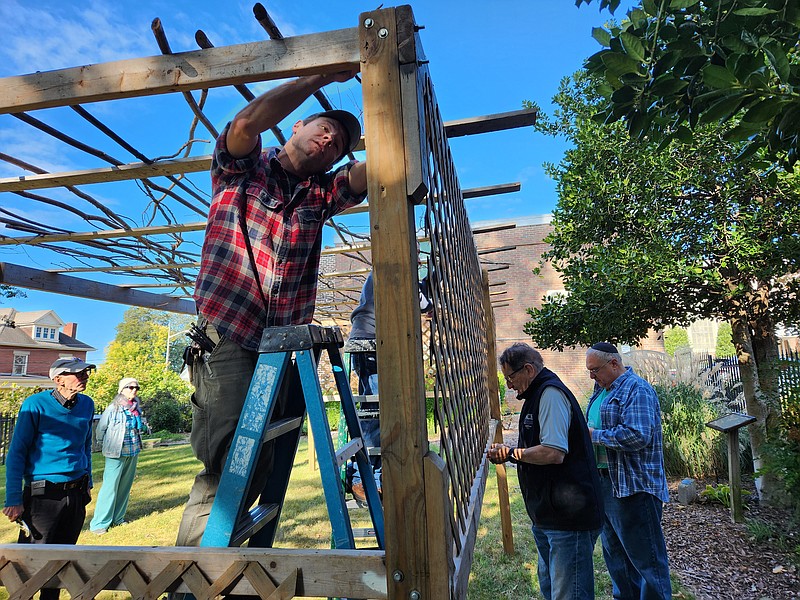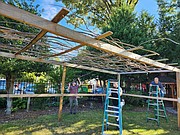On Sunday morning, Terry Wheeler, bundled in a white hat and a scarf, looked on as her husband, Norton, and assorted members of the Mizpah and B'Nai Zion congregations climbed small ladders and assembled wooden beams in the garden of the Mizpah congregation building.
As the structure took form, one of the men threw some branches on top.
"I give you a 4.5 on a 10 scale," one observer said.
"Lookin' good guys," Terry Wheeler yelled.
The volunteer builders continued to toss the scraggly wood on top, but as they approached completion, the walls left the interior largely exposed, and the roof still did not look like it would be reliable in the event of rain. The structure is "not supposed to completely keep the weather out," Wheeler noted.
The occasion for this uncommon hut was Sukkot, a Jewish holiday acknowledging the fragility of nature, which began at sundown Sunday and will last through the week. Many in the local Jewish community have also – in line with scriptural specifications – erected their own personal "Sukkahs" in their yards and driveways. There, they will eat meals, host friends, and perhaps in rare cases, even sleep overnight over the duration of a holiday, which, for many Jews in Chattanooga and beyond, brings an ancient perspective upon the rhythms of everyday modern life.
The tradition of erecting Sukkahs is, according to a common interpretation, "meant to be a living reminder of the wandering in the wilderness from Egypt to the land of Israel after the exodus," B'Nai Zion congregation Rabbi Sam Rotenberg said by phone. "The huts are also a reminder to find joy in fleeing things, which are all of life."
It's a busy time of year on the Jewish calendar, with Rosh Hashanah – the Jewish New Year -- and Yom Kippur -- a day of fasting and atonement -- having only recently passed. When Sukkot wraps up, then comes the Simchat Torah, wherein the Torah is completed, and then started anew, right back at Genesis. But whereas many of these major holidays focus on introspection, Rotenberg said, Sukkot, traditionally a harvest festival, is oriented outward, toward the elements.
Some people adorn their personal Sukkahs with elaborate tapestry and lights. But all are supposed to meet specifications outlined in holy literature. Leviticus 23:42 declares that, "You shall live in booths for seven days." Sukkahs must have three walls and an opening on one side. They must have natural covering on the roof, but it should remain possible to see through to the sky. In a related ceremony, observers of Sukkot must on each day wave a bundle consisting of willow, palm, myrtle and an etrog – a citrus fruit which looks like a bumpy lemon.
Mizpah congregation Rabbi Craig Lewis uses overgrowth from his backyard to adorn his Sukkah, which is built from a prefabricated metal structure. He planned to build his Sukkah on Saturday evening -- it was Sabbath, but that was when he had the time -- as he listened to the Kansas-TCU football game.
The idea, Lewis said, is to spend as much time in and around the Sukkah as possible. He and his wife host family dinners inside, invite neighbors for a drink. Working remotely at the height of the pandemic, he brought out his computer and led services and classes from inside his Sukkah. He does not, however, sleep in the Sukkah.
"Too many critters on Signal," Lewis said.
After vacating its own building on McBrien Road because of concerns about its stability, the B'Nai Zion congregation shares the Mizpah Congregation building. As such, the two congregations will also share the communal Sukkah.
The B'nai Zion congregation men's club will host a "Steak and Scotch" gathering in the Sukkah this week. Mispah will have a Friday night service in the Sukkah, followed by "sushi in the Sukkah." The idea, Lewis said, is to provide as many occasions as possible for people, even those who don't have their own Sukkah, to fulfill the "mitzvah" – religious duty – of "dwelling in the Sukkah."
Sometime, over the course of his own Sukkah's brief existence, Lewis said the leaves on the roof will change.
"If I'm sitting in my Sukkah, and a swift wind blows, you can kind of see the walls move a little bit, and you can see the leaves above you rustling a little bit," he said. "It just reminds you that everything is on the course of changing, and in a moment, things can be knocked down."
When the structure was completed Sunday morning at the Mizpah congregation garden, Ruth Longway arrived to adorn it. Norton Wheeler, of the B'Nai Zion congregation, helped her put up tapestry, which swayed in the wind along the back of the structure. They added a finish of white fabrics depicting pomegranates "Pomegranate are always in good taste at any Jewish event," Longway said.
Longway's husband, Richard Zachary, the organizer of the Sukkah building event, said that he and Longway would not be building a Sukkah at home because they could use the one in the garden.
As Longway fussed with the tapestry, Zachary reflected that his parents' generation moved as quickly as they could to become "American."
"So a lot of these celebrations fell by the wayside," he said. "That being said, Jews being Jews and understanding traditions -- we still build the Sukkahs, we still decorate it, we still have worship services here, and we say the prayer.
"One hundred years from now, we hope the idea is still there with the kids of the future, because it means something. It's not just a bunch of wood and some panels of cloth. It actually represents something of our past, and hopefully, something of our future."
Contact Andrew Schwartz at aschwartz@timesfreepress.com or 423-757-6431. Follow him on Twitter @aonSchwartz.
Busy time on the Jewish calendar
A listing of Jewish holidays for September and October:
Rosh Hashanah: Sunset on Sept. 25 - nightfall on Sept. 27.
Yom Kippur: Sunset on Oct. 4 - nightfall on Oct. 5
Sukkot: Sunset on Sunday - nightfall on Oct. 16.
Shemini Atzeret and Simchat Torah: Sunset on Oct. 16 - nightfall on Oct. 18.

